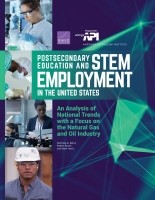| 来源类型 | Research Reports
|
| 规范类型 | 报告
|
| DOI | https://doi.org/10.7249/RR2115
|
| 来源ID | RR-2115-AMPI
|
| Postsecondary Education and STEM Employment in the United States: An Analysis of National Trends with a Focus on the Natural Gas and Oil Industry |
| Matthew D. Baird; Robert Bozick; Mark Harris
|
| 发表日期 | 2017
|
| 出版者 | RAND Corporation
|
| 出版年 | 2017
|
| 页码 | 100
|
| 语种 | 英语
|
| 结论 |
Trends in STEM Postsecondary Degree Attainment Between 2003 and 2015- The number of overall bachelor's degrees and the number of bachelor's degrees in STEM fields increased substantially over the past decade.
- While the number of associate's degrees also increased over the past decade, the number of associate's degrees awarded in STEM fields remained flat.
- Women earn more bachelor's degrees overall but earn fewer STEM bachelor's degrees than men, resulting in a large gender gap in the proportion of bachelor's degrees that are STEM.
- The share of bachelor's degrees that are in STEM fields varies considerably by race/ethnicity.
Relationship Among STEM Bachelor's Degree Attainment, STEM Employment, and Employment Outcomes- There is a large increase in wages associated with having a STEM bachelor's degree and with working in a STEM occupation.
- Oil and natural gas industry jobs pay significantly higher hourly wages.
- Women experience a larger increase than men in hourly wages, on average, for working in a STEM occupation.
- Blacks and Hispanics are less likely to work in STEM jobs compared with whites, and when they do procure STEM jobs, they earn less than whites.
Relationship Between Attaining a License or Certification and Employment Outcomes- Possessing a license or certification is associated with an increased probability of employment, but not necessarily higher wages.
- The benefits of holding a license or certification are strongest for those lacking a high school diploma, women, and Hispanics.
- The benefits associated with certifications and licenses were mostly for overall employment and employment in STEM jobs.
|
| 摘要 |
- The findings suggest that attaining a license or certification is a possible avenue for improving employment outcomes for traditionally underrepresented groups. This warrants further research.
- Women and racial or ethnic minorities are less likely to earn bachelor's degrees in STEM fields. Without stronger support for these traditionally underrepresented groups, the STEM economy in general and the oil and natural gas industry in particular may fail to optimize the pool of potential workers that it needs to sustain growth and innovation.
|
| 主题 | Natural Gas
; Occupations
; Petroleum
; Postsecondary Education
; STEM Education
; Vocational Education
; Wages and Compensation
; Workforce Management
|
| URL | https://www.rand.org/pubs/research_reports/RR2115.html
|
| 来源智库 | RAND Corporation (United States)
|
| 引用统计 |
|
| 资源类型 | 智库出版物
|
| 条目标识符 | http://119.78.100.153/handle/2XGU8XDN/108618
|
推荐引用方式
GB/T 7714 |
Matthew D. Baird,Robert Bozick,Mark Harris. Postsecondary Education and STEM Employment in the United States: An Analysis of National Trends with a Focus on the Natural Gas and Oil Industry. 2017.
|
|
文件名:
|
x1512747545627.jpg
|
|
格式:
|
JPEG
|

|
文件名:
|
RAND_RR2115.pdf
|
|
格式:
|
Adobe PDF
|
除非特别说明,本系统中所有内容都受版权保护,并保留所有权利。